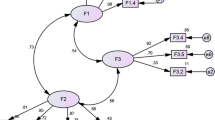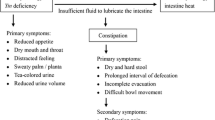Abstract
Attention to spiritual and religious issues is considered an important therapeutic method for patients with chronic disorders. This study aimed to assess the psychometric properties of a Persian version of the SpREUK-P questionnaire for evaluating spiritual and religious opinions among Iranian patients with chronic gastrointestinal diseases. This cross-sectional study was performed on 233 adult patients referring to the gastrointestinal clinic affiliated to Shiraz University of Medical Sciences, Shiraz, Iran, in 2017. The Persian version of the SpREUK-P questionnaire was prepared through the forward–backward translation method. The internal consistency of the questionnaire was evaluated by Cronbach’s alpha coefficient. Furthermore, the construct validity of the instrument was assessed via exploratory factor analysis, while convergent and discriminant validity were investigated using Spearman correlation. Cultural adaptation, linguistic equivalency, and content validity of the Persian version of the SpREUK-P questionnaire were approved by a ten-member team of Shiraz University of Medical Sciences. Content validity indices were more than 0.8% across all items. Cronbach’s alpha coefficients in terms of importance and practices were 0.81 and 0.71, respectively. Furthermore, the Persian version of the SpREUK-P showed excellent convergent validity and moderate to excellent discriminant validity. The results of exploratory factor analysis showed that all items were loaded properly on their own subscales, except for two items in the practice aspect and one item in the importance aspect. In conclusion, this study showed that the developed Persian SpREUK-P questionnaire is appropriate for assessing spiritual/religious opinions in Iranian patients with chronic diseases.
Similar content being viewed by others
References
Abernethy, A. D., Currier, J. M., Schnitker, S. A., Putman, K. M., Root Luna, L. M., Foster, J. D., Spencer, A., Jones, H., VanHarn, K., & Carter, J. (2020). Understanding the roles of religious comfort and strain on depressive symptoms in an inpatient psychiatric setting. Psychology of Religion and Spirituality, 12(3), 366. https://doi.org/10.1037/rel0000233
Aten, J. D., & Schenck, J. E. (2007). Reflections on religion and health research: An interview with Dr. Harold G. Koenig. Journal of Religion and Health, 46(2), 183–190. https://doi.org/10.1007/s10943-006-9076-z
Aten, J. D., & Worthington, E. L., Jr. (2009). Next steps for clinicians in religious and spiritual therapy: An endpiece. Journal of Clinical Psychology, 65(2), 224–229. https://doi.org/10.1002/jclp.20562
Balboni, T. A., Paulk, M. E., Balboni, M. J., Phelps, A. C., Loggers, E. T., Wright, A. A., Block, S. D., Lewis, E. F., Peteet, J. R., & Prigerson, H. G. (2010). Provision of spiritual care to patients with advanced cancer: Associations with medical care and quality of life near death. Journal of Clinical Oncology, 28(3), 445. https://doi.org/10.1200/JCO.2009.24.8005
Büssing, A. (2010). Spirituality as a resource to rely on in chronic illness: The SpREUK questionnaire. Religions, 1(1), 9–17. https://doi.org/10.3390/rel1010009
Büssing, A., Abu-Hassan, W. M., Matthiessen, P. F., & Ostermann, T. (2007). Spirituality, religiosity, and dealing with illness in Arabic and German patients. Saudi Medical Journal, 28(6), 933–942.
Büssing, A., Franczak, K., & Surzykiewicz, J. (2016). Spiritual and religious attitudes in dealing with illness in Polish patients with chronic diseases: Validation of the Polish version of the SpREUK questionnaire. Journal of Religion and Health, 55(1), 67–84. https://doi.org/10.1007/s10943-014-9967-3
Büssing, A., Michalsen, A., Balzat, H.-J., Grünther, R.-A., Ostermann, T., Neugebauer, E. A., & Matthiessen, P. F. (2009). Are spirituality and religiosity resources for patients with chronic pain conditions? Pain Medicine, 10(2), 327–339. https://doi.org/10.1111/j.1526-4637.2009.00572.x
Büssing, A., Recchia, D. R., Gerundt, M., Warode, M., & Dienberg, T. (2017). Validation of the SpREUK—Religious Practices Questionnaire as a measure of Christian religious practices in a general population and in religious persons. Religions, 8(12), 269. https://doi.org/10.3390/rel8120269
Carey, L. B., Hodgson, T. J., Krikheli, L., Soh, R. Y., Armour, A.-R., Singh, T. K., & Impiombato, C. G. (2016). Moral injury, spiritual care and the role of chaplains: An exploratory scoping review of literature and resources. Journal of Religion and Health, 55(4), 1218–1245. https://doi.org/10.1007/s10943-016-0231-x
Dilmaghani, M. (2018). Importance of religion or spirituality and mental health in Canada. Journal of Religion and Health, 57(1), 120–135. https://doi.org/10.1007/s10943-017-0385-1
El Nawawi, N. M., Balboni, M. J., & Balboni, T. A. (2012). Palliative care and spiritual care: The crucial role of spiritual care in the care of patients with advanced illness. Current Opinion in Supportive and Palliative Care, 6(2), 269–274. https://doi.org/10.1097/SPC.0b013e3283530d13
Evans, W. R., Stanley, M. A., Barrera, T. L., Exline, J. J., Pargament, K. I., & Teng, E. J. (2018). Morally injurious events and psychological distress among veterans: Examining the mediating role of religious and spiritual struggles. Psychological Trauma: Theory, Research, Practice, and Policy, 10(3), 360.
Fayers, P. M., & Machin, D. (2013). Quality of life: The assessment, analysis and interpretation of patient-reported outcomes. John Wiley & Sons.
Fry, L. W. (2003). Toward a theory of spiritual leadership. The Leadership Quarterly, 14(6), 693–727. https://doi.org/10.1016/j.leaqua.2003.09.001
Gaufman, E. (2019). Come all ye faithful to the Russian world: Governmental and grass-roots spiritual discourse in the battle over Ukraine. In Religion During the Russian-Ukrainian Conflict (pp. 54–68). Routledge.
Gomez, R., & Fisher, J. W. (2003). Domains of spiritual well-being and development and validation of the Spiritual Well-Being Questionnaire. Personality and Individual Differences, 35(8), 1975–1991. https://doi.org/10.1016/S0191-8869(03)00045-X
Hall, E. J., & Powell, R. A. (2021). Valuing the spiritual. Journal of Religion and Health, 60(3), 1430–1435. https://doi.org/10.1007/s10943-021-01206-9
Harorani, M., Jadidi, A., Zand, S., Khoshkhoutabar, T., Rafiei, F., & Beheshti, S. Z. (2021). Spiritual care in hospitalized patients in Iran: An action research study. Journal of Religion and Health. https://doi.org/10.1007/s10943-021-01302-w
Haussmann, A., Schaeffeler, N., Hautzinger, M., Weyel, B., Eigentler, T., Zipfel, S., & Teufel, M. (2017). Religious/spiritual needs and psychosocial burden of melanoma patients. Psychotherapie, Psychosomatik, Medizinische Psychologie, 67(9–10), 413. https://doi.org/10.1055/s-0043-101373
Jafari, P., Forouzandeh, E., Bagheri, Z., Karamizadeh, Z., & Shalileh, K. (2011). Health related quality of life of Iranian children with type 1 diabetes: Reliability and validity of the Persian version of the PedsQL™ Generic Core Scales and Diabetes Module. Health and Quality of Life Outcomes, 9(1), 104. https://doi.org/10.1186/1477-7525-9-104
Kézdy, A., Martos, T., Boland, V., & Horváth-Szabó, K. (2011). Religious doubts and mental health in adolescence and young adulthood: The association with religious attitudes. Journal of Adolescence, 34(1), 39–47. https://doi.org/10.1016/j.adolescence.2010.03.003
Kline, P. (2014). An easy guide to factor analysis. Routledge.
Koenig, H. G. (2015). Religion, spirituality, and health: A review and update. Advances in Mind-Body Medicine, 29(3), 19–26.
Oman, D., & Lukoff, D. (2018). Mental health, religion, and spirituality. In D. Oman (Ed.), Why Religion and Spirituality Matter for Public Health. Religion, spirituality and health: A social scientific approach. Springer.
Ostermann, T., Büssing, A., & Matthiessen, P. (2004). Pilot study for the development of a questionnaire for the measuring of the patients’ attitude towards spirituality and religiosity and their coping with disease (SpREUK). Forschende Komplementarmedizin und klassische Naturheilkunde= Research in Complementary and Natural Classical Medicine, 11(6), 346–353.
Parvizi, M. M., Amini, M., Dehghani, M. R., Jafari, P., & Parvizi, Z. (2016). Psychometric properties of the Persian version of the ambulatory care learning educational environment measure (ACLEEM) questionnaire, Shiraz. Iran. Advances in Medical Education and Practice, 7, 559. https://doi.org/10.2147/AMEP.S112861
Salsman, J. M., Pustejovsky, J. E., Jim, H. S., Munoz, A. R., Merluzzi, T. V., George, L., Park, C. L., Danhauer, S. C., Sherman, A. C., & Snyder, M. A. (2015). A meta-analytic approach to examining the correlation between religion/spirituality and mental health in cancer. Cancer, 121(21), 3769–3778. https://doi.org/10.1002/cncr.29350
Snider, A.-M., & McPhedran, S. (2014). Religiosity, spirituality, mental health, and mental health treatment outcomes in Australia: A systematic literature review. Mental Health, Religion & Culture, 17(6), 568–581. https://doi.org/10.1080/13674676.2013.871240
Sujatha, R., & Jayagowri, K. (2017). Assessment of palliative care awareness among undergraduate healthcare students. Journal of Clinical and Diagnostic Research: JCDR, 11(9), JC06.
Thune-Boyle, I. C., Stygall, J. A., Keshtgar, M. R., & Newman, S. P. (2006). Do religious/spiritual coping strategies affect illness adjustment in patients with cancer? A systematic review of the literature. Social Science & Medicine, 63(1), 151–164. https://doi.org/10.1016/j.socscimed.2005.11.055
Unterrainer, H.-F., Ladenhauf, K. H., Wallner-Liebmann, S. J., & Fink, A. (2011). Different types of religious/spiritual well-being in relation to personality and subjective well-being. Journal of Religion and Health, 21(2), 115–126. https://doi.org/10.1007/s10943-004-1144-7
Vaughan, F. (2002). What is spiritual intelligence? Journal of Humanistic Psychology, 42(2), 16–33. https://doi.org/10.1177/0022167802422003
Waters, E. K., Doyle, Z., & Finlay, E. (2018). Spirituality/religiosity (SpR), leisure-time physical activity, and sedentary behaviour in students at a Catholic University. Journal of Religion and Health, 57(3), 869–882. https://doi.org/10.1007/s10943-017-0440-y
Woods, G. (2007). The ‘Bigger Feeling’ the importance of spiritual experience in educational leadership. Educational Management Administration & Leadership, 35(1), 135–155. https://doi.org/10.1177/1741143207071390
Yang, W., Staps, T., & Hijmans, E. (2010). Existential crisis and the awareness of dying: The role of meaning and spirituality. OMEGA-Journal of Death and Dying, 61(1), 53–69. https://doi.org/10.2190/OM.61.1.c
Zini, A., Büssing, A., & Sgan-Cohen, H. D. (2010). Validity and Reliability of the Hebrew Version of the SpREUK questionnaire for religiosity, spirituality and health: An application for oral diseases. Religions, 1(1), 86–104. https://doi.org/10.3390/rel1010086
Acknowledgements
This article was extracted from the thesis written by Amin Hojati Moghadam as partial fulfillment of the requirements for obtaining his medical degree at Shiraz University of Medical Sciences, Shiraz, Iran. Furthermore, this study was supported by Vice Chancellor of Research of Shiraz University of Medical Sciences, Shiraz, Iran (grant number: 15372). The authors would like to thank Dr. Seyed Ali Hosseini of Shiraz University of Medical Sciences for editing the English language of this manuscript.
Author information
Authors and Affiliations
Contributions
MP, ZB, MMP, and AB contributed to conception and design of the work; AHM contributed to data acquisition, ZB, MMP, and MP contributed to data analysis; MP, MMP, ZB, and AB contributed to data interpretation; AHM, MP, and MMP drafted the work; MP, AB, and ZB revised the work critically for important intellectual content; MP, ZB, MMP, AB, and AHM approved the version to be published and agree to be accountable for all aspects of the work.
Corresponding author
Ethics declarations
Conflict of interest
The authors declare that there was no conflict of interest to declare.
Additional information
Publisher's Note
Springer Nature remains neutral with regard to jurisdictional claims in published maps and institutional affiliations.
Supplementary Information
Below is the link to the electronic supplementary material.
Rights and permissions
About this article
Cite this article
Pasalar, M., Bagheri, Z., Hojati-Moghadam, A. et al. Psychometric Properties of a Persian Version of the SpREUK-P Questionnaire: An Instrument for Measuring the Importance and Frequency of Spiritual/Religious Practices in Iranian Patients with Chronic Gastrointestinal Diseases. J Relig Health 61, 3458–3469 (2022). https://doi.org/10.1007/s10943-021-01427-y
Accepted:
Published:
Issue Date:
DOI: https://doi.org/10.1007/s10943-021-01427-y




